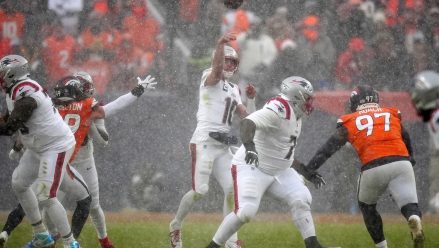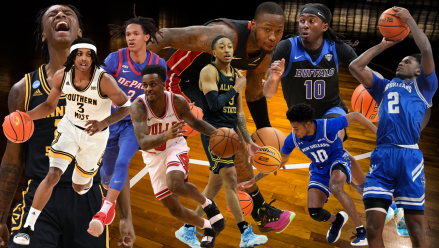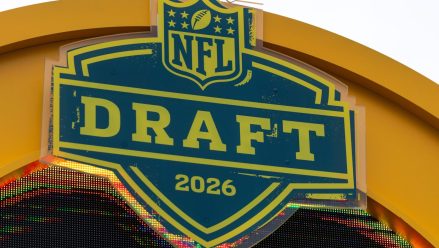WASHINGTON, D.C. — The second intermission beer line curled from Section 100 nearly to 103. Many of these thirsty folk swaddled in red would ultimately not make it back to their seats before the third period began when the Washington Capitals held off the Montreal Canadiens in Game 2 of the NHL Eastern Conference semifinals.
There was another option. But a scant few were taking advantage of it. Just a quick walk around the Capital One Arena concourse, tucked next to a stairwell that led to down to 6th and F, the first retail sportsbook opened inside a North American sports arena was mostly vacant. The Caesars Sportsbook (then William Hill) debuted in May 2021.
Seven states have since allowed operators to follow that lead, and operators have opened retail spaces in Arizona, Illinois, and Maryland.
A handful of patrons lounged at the Caesars bar watching the Orioles-Nationals game happening a few miles away. Two men loitered in the betting kiosk foyer that opened outside. A couple ate in the corner.
A partially filled bottle sat unattended, near the security guard hunched in a chair watching the NBA playoffs.
Much more of the 20,000 square feet had been occupied pre-game when it felt very much like a busy sports bar, not a sportsbook that was supposed to lead a movement to change how fans and bettors interact with live sporting events.
It was festive, but it wasn’t what Capitals owner Ted Leonsis envisioned this landmark space would be when he began championing legal sports betting’s incursion into arenas and stadiums and opened his own sportsbook.
The problem is multi-faceted, said Jessica Feil, vice president of regulatory affairs and compliance at the sports betting entertainment firm OpenBet. Crucially, Feil told InGame, the industry doesn’t yet know what bettors want from an in-venue experience. Bettors, just seven years after legal sports betting became an option, probably don’t know either. Fans seem generally oblivious.
There is one certainty, however.
The reality is, in these venues, in these arenas, we have a lot of bettors who are digital-first. They’re familiar with mobile betting. Their whole lives are on their mobile devices, everything from entertainment, to banking, to your school, to your work, everything’s on mobile.
“So how do we make that transition from mobile to the real-time space?
— Jessica Feil, OpenBet
“I think it comes down to products,” Fanatics Sportsbook & Gaming Chief Business Officer Ari Borod told InGame, “and I think the success and the sophistication of the online products has continued to advance quite rapidly. For the most part, it’s a good experience to take out your phone and be able to bet with it. You don’t necessarily have to go to that one location and sit in traffic.
“Some people prefer that. (Other) people prefer the retail experience.”
There have been positive byproducts of the so-far tepid reception to in-venue sportsbooks. Feil noted that the Caesars book at Capital One Arena is a full-time responsible gambling oracle of sorts because messaging on the subject remains on display full-time, even when games aren’t being played but the facility is open.
And even with some still opposed to sportsbooks encroaching into their fields of dreams — one Cubs fan decried the DraftKings “gambling den” next to Wrigley Field — the idea didn’t produce the outcome worthy of the stigma it generated.
“I think a lot of this is tied to a better understanding of how we use technology,” Brett Abarbanel, executive director of the International Gaming Institute at UNLV, told InGame. “And in some ways, that’s good. And in some ways, that’s not so good. This concern about having the book in the venue is about the corruption of sports.
“And for better or worse, we found that it’s not physical proximity that necessarily corrupts sport. In a time when we’re able to access everything so easily in a digital and virtual space, you don’t need to be right on top of things to be able to corrupt the sport. And so having betting physically close to it doesn’t have that volume of threat that it had 50, 100 years ago.”
Meanwhile in Wrigleyville … much the same
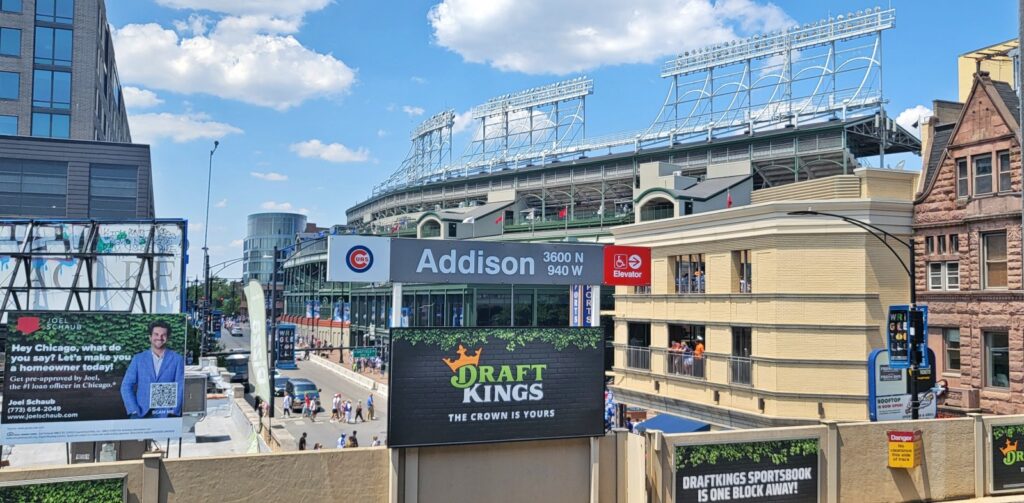
While the Caesars venue at Capital One Arena requires some hunting to find, the DraftKings sportsbook adjacent to Wrigley Field is difficult to miss. L train riders disembarking at the Addison Street station are met immediately with familiar green and orange branding. They reach the gleaming glass sportsbook’s entrance before a ballpark gate.
A few hours before a recent Cubs game, though, activity at the array of betting kiosks was minimal. But the Bavarian pretzels and Old Styles were moving.
Sports betting is available via mobile and online also and, with roughly 95% of sports betting conducted on phones, the era of the in-venue sportsbook might have passed before it ever fully arrived, Abarbanel said. In essence, they could be suburban shopping malls that never got their heyday.
“It’s almost like we’ve passed the moment in the kind of human and technology interaction history where a really cool high-tech book at a stadium would be the ultimate destination to go to,” she said. “Because now we can get this on our phones.”
It’s almost like we just sort of bypassed that part of the technological innovation history for humankind to a point where this is such a neat and interesting idea, but it’s almost dated by the time it shows up in the stadium.
— Brett Abarbanel, UNLV
Combining the game experience with a betting experience is difficult, Feil said, especially in historic venues like Wrigley Field where constructing a sportsbook with direct access to seating areas is often impractical.
Some will undoubtedly come just for the game. Anyone wanting to wager could avoid game-day crowds and costs to watch and bet in most jurisdictions from their couches.
“Those who go to a baseball game to see Aaron Judge are just like those who went to watch Babe Ruth. They want the experience,” Spectrum Gaming Senior Policy Advisor Michael Pollock told InGame. “If they are bettors, they may place a bet or they may have already done so. Betting on a sporting event and watching a sporting event have overlapping fan bases, but they are decidedly different. One is a transaction, the other is an experience.”
Creating for fans a gambling experience — if they want it — and bettors an encompassing take-me-out-to-the-ballgame rush remains nettlesome.
“You want them to have the excitement of the stadium, the excitement of the crowds, the excitement of hearing the vendors and the announcers and things like that, so that it’s all one experience that will help them both enjoy the gaming entertainment (and) the game itself,” Feil said. “Because I think especially in the venue setups, they’re not looking just for kiosks to play on. They are truly looking for places to sit with their friends — with lounges, food, other activations.
“They could be on their mobile device, but they’re in the sportsbook and they’re hanging with their friends there. It can’t just be, ‘Here’s a space and here’s where you can bet. And then you walk around the corner of the stadium.’ It should be ‘Here is here.’ ”
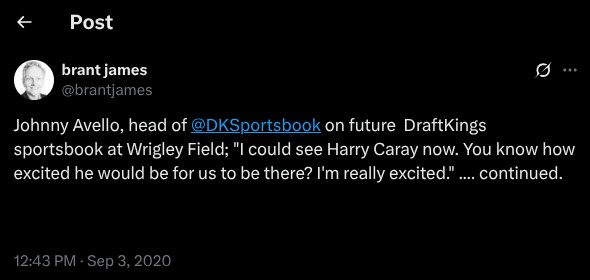
Chicago’s other pro sports teams haven’t clamored for their own retail sportsbooks. The Bears and White Sox have sports betting partnerships but no retail space for betting. The United Center features a FanDuel sportsbook lounge, a popular alternative in numerous venues that brand upscale restaurants or bar spaces without retail betting facilities.
Since it began taking bets in March 2024, the DraftKings outlet has generated around $10 million in in-person handle, making it 10th of 15 retail shops in Illinois during that span.
Then-GeoComply CEO David Briggs said in 2022 of Leonsis’ Washington, D.C. plan that “if there’s a nice cash experience and nice remote experience and they go away to their state or their team and their stadium … they’re going to say, ‘I want this here, too.’ ”
They did. And now, increasingly, they’ve don’t. Fighting the phones has proved to be too much.
The Fanatics sportsbook at Progressive Field in Cleveland, home of the Guardians, closed in April after two years of under-performance in a state where 98% of betting is online. The outlet lost $226,000 last year and had taken just $19,018 in bets in 2025. Retail sportsbooks in the Cleveland Cavaliers’ and Cincinnati Reds’ venues have also shuttered.
“We wanted to be able to cover whatever the customer demand is, [but] even as a standalone business, we don’t look at retail just as a standalone revenue generator,” Borod said. “It also has to be a good brand experience and customer experience. It’s a place you can host a watch party. It’s a place you can go watch with friends who may not be betting on the game at all, and you have a bunch of very diverse sports fans in there watching together.
“And the one in Progressive Field wasn’t that. It was very much a transactional thing. And so that’s probably the reason why, out of all of them, that was the one that we scaled down a bit.”
The space was converted to a Guardians apparel shop.
“When you have a physical space in a multi-purpose facility, you are innately competing with other potential revenue-generating options that could fill your space,” Abarbanel explained. “So in sport hospitality, there’s tons of these.
“So with a physical sportsbook inside a stadium, for it to be successful, it doesn’t need to be just successful for the sportsbook’s bottom line,” he continued. “It also will have to be worth it in comparison to all the other revenue-generating options that the sports venue might have available. So at the book level from the get-go, foot traffic is lower than an online customer base.”
In Phoenix, where all three big-four professional sports franchises have sportsbooks attached or on their venue property, in-person handle has also been paltry as compared to mobile. Last October, for example, FanDuel’s sportsbook at the Footprint Center (now PHX Arena), where the Suns play, accounted for $1.49 million in handle while mobile brought in $250.9 million. DraftKings, the state leader in handle that month, took in $258.6 million via mobile and $3.2 million at its retail book at TPC Scottsdale.
FanDuel subsequently announced that the PHX Arena sportsbook will close in July.
Creating communal sports betting vibe is tricky
Spurred by lessons learned during the isolation of COVID-19 lockdowns, gambling industry executives began focusing on a communal approach to sportsbooks. Leonsis, owner of Monumental Sports & Entertainment (and by extension Capital One Arena, the Capitals, Wizards and Mystics), was the first pro sports team owner to advance legal sports betting as an engagement tool. He foresaw in-venue sportsbooks as a sort of together-alone Genius Bar experience.
Is it time for a force restart?
“I think something that was really interesting is some of these (sportsbooks) were designed specifically like sports bars with the idea that you go, you get a drink, and you sit and you watch the game,” Abarbanel said. “But if this is a space where you’re already in the stadium, then why would you do that? Why wouldn’t you go back to your seat and watch the game live?”
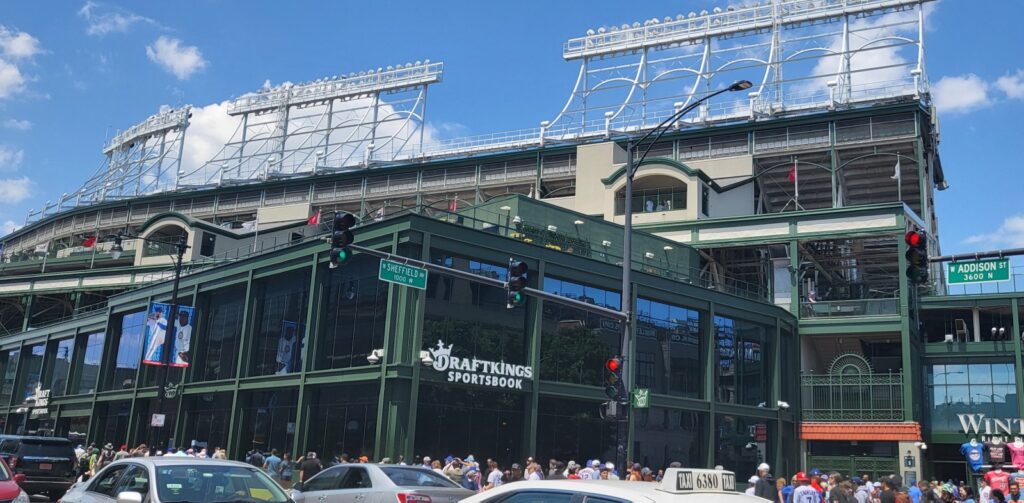
Building actual sportsbooks instead of retrofitting old retail or bar spaces might help.
Just two NHL arenas and one MLB and NBA venue — and no current NFL stadium — were in the process of design or construction before the repeal of the Professional and Amateur Sports Protection in 2018 allowed states to legalize sports betting.
With major leagues now amenable to in-venue retail betting, the next generation of arenas could be designed with purpose-built sportsbooks and the amenities bettors expect and fans might find compelling.
“With the rise of gaming and the partnerships between gaming companies and sports teams, it makes perfect sense that you make this part of what your new venue is going to look like because your fans want to be able to engage, but they might not want to be in the sportsbook the whole time,” Feil said. “They also might not want to be in their seats the whole time.
“So an ability for them to go in between those spaces but not miss any of the action on the field is huge for them.”
Commanders could make sportsbook history again
The District could complete its pro venue gambling roster within the decade. The Commanders, who opened the NFL’s first in-stadium retail sportsbook in 2023 (the year NFL owners voted to allow it) are scheduled to move into a new home on the site of RFK Stadium in 2030. They would seem likely to bring their partnership with Fanatics Sportsbook from Northwest Stadium in Maryland with them.
District law allows four pro venues to house sportsbooks with so-called Class A operator licenses. Just three arenas — Capital One Arena, Audi Field and Nationals Park — host sportsbooks.
Fanatics operates as a mobile-only sportsbook in D.C. with market access through the National Women’s Soccer League’s Washington Spirit franchise, which shares Audi Field with Major League Soccer’s DC United. FanDuel’s retail sports book at Audi Field closed in February after three years.
According to the DC Office of Lottery and Gaming, one Class A license is available — at CareFirst Arena, home of the Women’s National Basketball Association’s Mystics franchise. Monumental Sports & Entertainment hasn’t applied for a license there, but the company announced ESPN Bet as a partner for all of its teams in January.
D.C. law would have to be changed, a DC Lottery representative told InGame, to allow for a fifth pro sports retail license. A Commanders stadium could be eligible for a Class B or C license, however.
In some other NFL cities, sportsbooks are adjacent to the Cardinals’, Giants’ and Jets/Giants’ stadiums, but the Commanders are the only franchise to break that once unthinkable membrane between the NFL and outward acceptance of legal gambling.
“I think they have an opportunity,” Feil said. “The Commanders have been pretty, I think, forward-looking with their partnerships on this front. I think there’s an opportunity for them to do it, and D.C.’s already embraced this idea with the other stadiums.
“And I appreciate that people also want to maintain a sort of all-ages friendly atmosphere at these events. But at the same time, this is part of the culture. You have relationships with gaming companies and partnerships with them. You’re advertising for them at the events. I think adding in another space where people can enjoy gaming responsibly and with their friends is totally a value add.”


